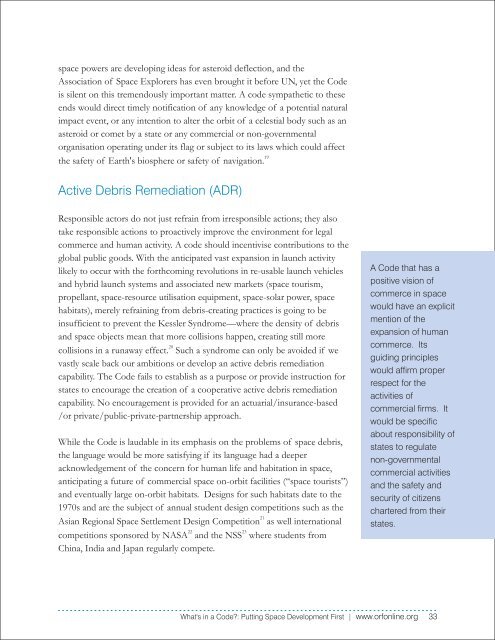AwaitingLaunch_1397728623369
AwaitingLaunch_1397728623369
AwaitingLaunch_1397728623369
You also want an ePaper? Increase the reach of your titles
YUMPU automatically turns print PDFs into web optimized ePapers that Google loves.
space powers are developing ideas for asteroid deflection, and the<br />
Association of Space Explorers has even brought it before UN, yet the Code<br />
is silent on this tremendously important matter. A code sympathetic to these<br />
ends would direct timely notification of any knowledge of a potential natural<br />
impact event, or any intention to alter the orbit of a celestial body such as an<br />
asteroid or comet by a state or any commercial or non-governmental<br />
organisation operating under its flag or subject to its laws which could affect<br />
19<br />
the safety of Earth's biosphere or safety of navigation.<br />
Active Debris Remediation (ADR)<br />
Responsible actors do not just refrain from irresponsible actions; they also<br />
take responsible actions to proactively improve the environment for legal<br />
commerce and human activity. A code should incentivise contributions to the<br />
global public goods. With the anticipated vast expansion in launch activity<br />
likely to occur with the forthcoming revolutions in re-usable launch vehicles<br />
and hybrid launch systems and associated new markets (space tourism,<br />
propellant, space-resource utilisation equipment, space-solar power, space<br />
habitats), merely refraining from debris-creating practices is going to be<br />
insufficient to prevent the Kessler Syndrome—where the density of debris<br />
and space objects mean that more collisions happen, creating still more<br />
20<br />
collisions in a runaway effect. Such a syndrome can only be avoided if we<br />
vastly scale back our ambitions or develop an active debris remediation<br />
capability. The Code fails to establish as a purpose or provide instruction for<br />
states to encourage the creation of a cooperative active debris remediation<br />
capability. No encouragement is provided for an actuarial/insurance-based<br />
/or private/public-private-partnership approach.<br />
While the Code is laudable in its emphasis on the problems of space debris,<br />
the language would be more satisfying if its language had a deeper<br />
acknowledgement of the concern for human life and habitation in space,<br />
anticipating a future of commercial space on-orbit facilities (“space tourists”)<br />
and eventually large on-orbit habitats. Designs for such habitats date to the<br />
1970s and are the subject of annual student design competitions such as the<br />
21<br />
Asian Regional Space Settlement Design Competition as well international<br />
22 23<br />
competitions sponsored by NASA and the NSS where students from<br />
China, India and Japan regularly compete.<br />
A Code that has a<br />
positive vision of<br />
commerce in space<br />
would have an explicit<br />
mention of the<br />
expansion of human<br />
commerce. Its<br />
guiding principles<br />
would affirm proper<br />
respect for the<br />
activities of<br />
commercial firms. It<br />
would be specific<br />
about responsibility of<br />
states to regulate<br />
non-governmental<br />
commercial activities<br />
and the safety and<br />
security of citizens<br />
chartered from their<br />
states.<br />
What's in a Code?: Putting Space Development First | www.orfonline.org 33








